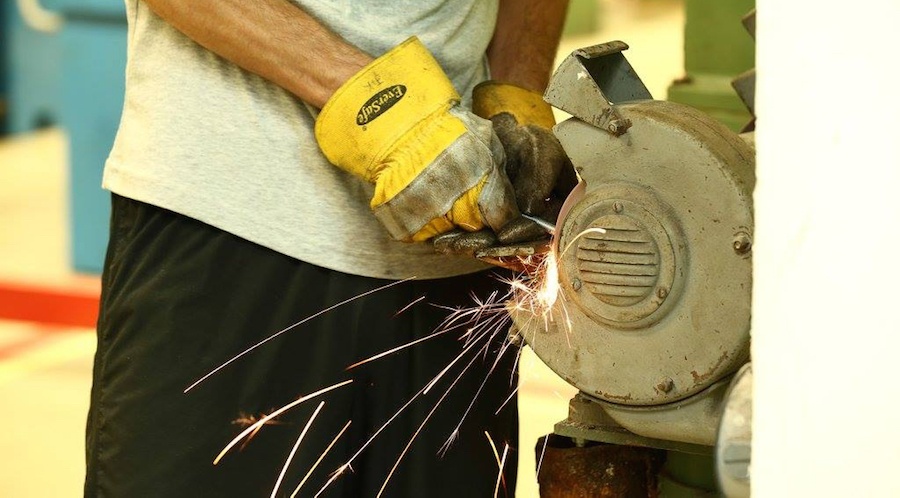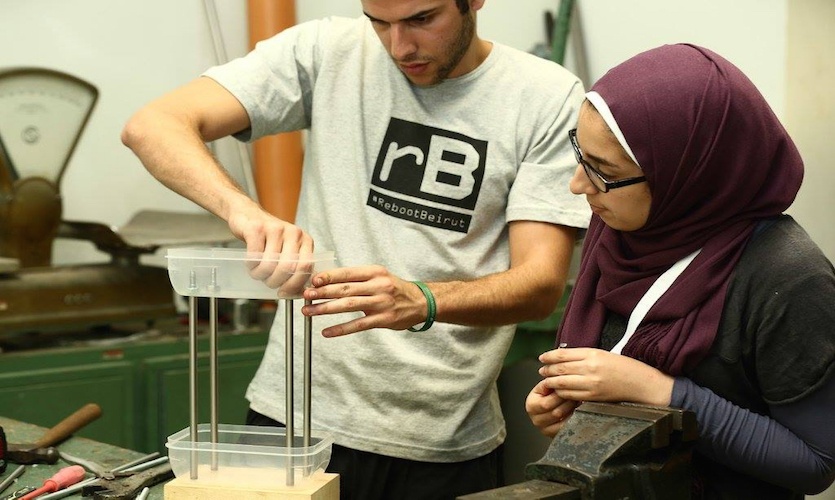AUB students Reboot Beirut at hackathon

“The moment you realize that you can build and change things, you see something sucks and you do something about it, build a company, hire people, and then there’s no going back,” said Habib Haddad, Wamda CEO, on September 16. He was speaking to a crowd of dozens of university students.
“The next two days is about proving that you that you can do this… The crux of the work is you coming together, having an idea, building teams and potentially taking it to market,” he said.
Last weekend marked the first hackathon organized by both Wamda and the American University of Beirut (AUB) in Lebanon. The three day event, titled Reboot Beirut, gathered dozens of AUB students and tasked them with finding solutions to some of Lebanon’s many challenges in less than 36 hours.
By Friday students had divided themselves into teams of six, each tackling a different topic ranging from pollution, healthcare, parking, and farming. They were led by mentors and industry experts, largely AUB alumni, to guide them through idea development, implementation, design and business strategy. Most the students were engineering seniors at AUB majoring either in computer and communications engineering (CCE), electrical and computer engineering (ECE), or computer science.

“When I graduated from here there was nothing like this [hackathon] … A lot of people have a great idea but don’t know who to start it with [or where to find that person], a university is a great place to start,” said Hassane Slaibi, an AUB alumni and cofounder of Roadie Tuner.
Slaibi served as a mentor for the teams. Other mentors included Rodric Haddad from Coddict and Abed Halawi from Vinelab.
The first place prize of $1000 went to My Nurse, an app that connects at-home patients to nurses. A patient or caretaker opens the app, decides on the gender of the nurse, what service they need, and the location. The app recommends nurses in nearby areas based on the inputted data. The nurse logs the patient’s progress and patients are able to rate the nurse upon their departure.
The team said such an app promotes a sharing economy and is more affordable than hiring nurses elsewhere. One of the group members had previously conducted interviews with patients, pharmacists and nurses to assess needs and demand before developing the app. Such market research made the group attractive to the panel of judges who encouraged teams to ensure their solution solved a real problem faced by their target audience.

The second place prize of $500 was awarded to team Spottr, mentored by Rodric Haddad and Mike Clarke. The team built an app directed at an exclusive AUB community alerting them when public parking spots are available. The group had on Friday pitched an idea about sensors on parking spots, but pivoted after surveying their audience about their parking experience.
Pivoting or changing the idea all together was encouraged by mentors, who advised teams to be open to an idea flopping and coming up with a new one. It was most important to listen to the target audience’s needs and iterate as such.
Another group that shifted from their original idea was QUAOL, a pollution assessment box. On day one, the team of six were considering a solution to compensate electricity outages with energy generated by stationary bikes at gyms. Led by Wamda’s Mohammad Haidar, the team landed on the idea of a the pollution assessment reader that can be used in homes and in cities. Knowing the levels of air and noise pollution can be a contributing factor to estimating the value of real estate, the team argued.

Two teams developed solutions to help tackle traffic. Poolme, whose team was mentored by Halawi, is a carpooling reward platform where drivers and passengers earn points with every ride. Points are then translated into deals and discounts at gas stations, restaurants or gyms.
RebikeBeirut adapted an already existing bike sharing model to Lebanon. Using local knowledge of traffic chokepoints and Beirut’s landscape, the team’s app would show users where both parking lots and their bike stations were located.
Team Shatlé, meaning ‘plant’ in Arabic, developed an optimized vertical planting kit for home use. The kit allows for an automatic adjustment of light and moisture depending on the plant’s needs. One of the features is a buzzer that goes off when water levels are low. A corresponding app allowing users to gather data on the plants and on what the given plant may need to grow well. The team came in third place at the hackathon.

To determine winners on Sunday, a panel of judges listened to five minute presentations of the groups and deliberated to choose the winners. Prizes were presented by Dr. Ayman Kayssi, professor and associate dean at AUB’s Faculty of Engineering and Architecture. Dr. Kayssi is also cofounder of technology development and consulting company Saugo 360.
"[The hackathon] was very beneficial for me in refining my ideas and materializing them into a prototype," said Hussein Sleiman, member of My Nurse. "I'm going to pursue the startup and just waiting for some seed funding to accelerate our pace," he said.
In a closing panel talk, AUB alumni who have launched their own startups, discussed the challenges and opportunities to developing a personal businesses. They also noted the high value and access to resources a university like AUB can provide for the students.
“You have much more power in your hands, use it what you’re good at. Build stuff,” said Habib Haddad.
Curious to know more? Check our Facebook page.


